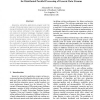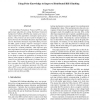85 search results - page 9 / 17 » A Hybrid Approach to Distributed Constraint Satisfaction |
102
click to vote
EMO
2009
Springer
15 years 6 months ago
2009
Springer
To model combinatorial decision problems involving uncertainty and probability, we introduce stochastic constraint programming. Stochastic constraint programs contain both decision...
110
click to vote
AMC
2007
14 years 11 months ago
2007
In a distributed computing system (DCS), we need to allocate a number of modules to different processors for execution. It is desired to maximize the processor synergism in order...
ICSE
2004
IEEE-ACM
15 years 11 months ago
2004
IEEE-ACM
Immersive, interactive applications grouped under the concept of Immersipresence require on-line processing and mixing of multimedia data streams and structures. One critical issu...
SAC
2008
ACM
14 years 11 months ago
2008
ACM
Increasing scale, dynamism, and complexity of hybrid grids make traditional grid resource scheduling approaches difficult. In such grids, where resource volatility and dynamism is...
IAT
2006
IEEE
15 years 5 months ago
2006
IEEE
The Distributed Probabilistic Protocol (DPP) is a new, approximate algorithm for solving Distributed Constraint Satisfaction Problems (DCSPs) that exploits prior knowledge to impr...


